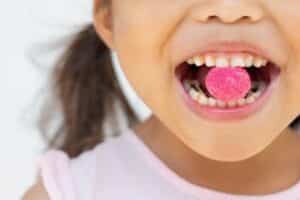
We’ve all heard that too much sugar is bad for you, but most people don’t know how sugar affects teeth.
Studies have shown that the amount of sugar you eat should be 10 percent or less of the total amount of food you consume. Here are some dental tips to understand the effects of sugar on teeth and how to teach your children proper preventative care.
How Sugar Affects Teeth
From the time you get your first tooth, there are tiny bacteria in your mouth that love sugar. They turn sugar into acid, which breaks down tooth enamel and causes cavities. Sugar can also cause gum disease, which can lead to periodontitis (a condition that affects the gums and bones that hold your teeth in place).
Some bacteria in your mouth absorb the sugar left on your teeth, resulting in plaque. Plaque causes erosion of tooth enamel over time. Dental decay, if left untreated, causes cavities and tooth loss. It is essential to limit sugar intake to protect oral health.
Overcoming Dental Anxiety
People are afraid of the dentist for a variety of reasons. By identifying the source of your fear, you can take steps to overcome it. Read on to learn more about dental anxiety:
What Is Dental Anxiety?
Dental anxiety is a common, generalized fear of the unknown associated with dental visits, and can affect people of all ages. The cause of fear can vary depending on the individual, but it can be anything from pain, drills, needles, gagging, being touched, loss of control, invasive treatments, shame about poor hygiene, or a generalized fear of doctors.
Signs and Symptoms
Dental anxiety can trigger many reactions ranging from stress, anxiety, sweating, excessive worrying, lack of concentration, mood swings, a racing heartbeat, and signs of distress (like crying or panicking).
Ease Your Fears
The most effective thing you can do is talk to your dentist about your fears. Chances are they have dealt with these situations before and can help find the best, personalized care for you.
If you are a parent or caregiver, it is also important to help build trust between your child and their dentist to prevent dental anxiety from developing early on.
The good news about dental anxiety is that advanced methods and technology, along with a caring staff and a soothing environment, can help you get over your fear of the dentist so you can get the care you need.
Dental Tips for Parents
As a parent, it is your job to instill in your children the value of good dental hygiene. Teaching them proper oral hygiene helps ensure that their teeth and gums will remain healthy into adulthood.
Here is some dental advice on how to make dental care a fun experience while educating them at the same time:
Start Early
As soon as your child’s first tooth erupts, you should start brushing their teeth to get them familiar with the routine. At around age 2-3, start putting a pea-sized amount of toothpaste on their toothbrush and walking them through the routine. Learning how to do it themselves can be an exciting achievement for your child and make brushing their teeth a more enjoyable experience.
Set an Example
Good dental habits start with you. If you brush your teeth twice a day in front of your child, they will want to do the same. Make this a special routine that you and your child do together so that they can look forward to it while maintaining consistency.
Encourage Good Eating Habits
Parents who limit sugary foods tend to teach their kids to eat well from a young age. This can lower the chance of getting cavities and other long-term dental problems.
Make It Fun
Simple things like letting your child pick their own toothbrush and toothpaste can make them more excited about brushing their teeth. There are many flavored kinds of toothpaste designed for young children so you know they will enjoy whichever one they choose. There are also many books and videos that can teach your child the importance of caring for teeth, making it both fun and educational.
Preventative Dental Care
As children get older, they develop habits that can be hard to break. Teaching them how to care for their teeth from an early age can prove to be a lifelong benefit. Find out how preventive dental care can help you get off to a good start:
Routine Checkups
Regular visits to the dentist for cleanings are very important for your child’s oral health. This is also a great chance for the dentist to catch any developing dental issues early and treat them before they become more serious.
Healthy Habits
Sugary foods can cause tooth decay. Unhealthy foods that lack essential nutrients can deplete the vitamins and minerals in your teeth. To promote healthier teeth and gums, choose a healthier diet for your child.
Proper Flossing
You can help floss your child’s teeth daily between the ages of 2 and 6 once their teeth begin to fit closely together. To avoid hurting your child’s teeth and gums, choose floss that is soft and flexible.
Once your child can floss, pay close attention to ensure proper flossing. Better yet, join in the fun by flossing with your child.
Special Treatments
Combined with proper home care, your child can benefit from dental treatments. Fluoride treatments from the dentist help protect permanent teeth from tooth decay because fluoride toothpaste may not be enough to protect their teeth.
Dental sealants can also protect your child’s cavity-prone teeth quickly and easily. They’re often used to cover deep pits and grooves on back teeth and are effective in preventing more than 80 percent of cavities.
A Healthy Smile
The secret to a healthy smile is consistent, preventative dental care. Educating your children early on about the effects of sugar can make a world of difference to their overall oral health.
Our passion is providing a nurturing, personalized experience for you and your child along with effective dental tips. Contact us and take that first step to healthier, happier smiles.

Comments are closed.